Sometimes an event in the relentless flood of news uncorks a torrent of memories. That was the case in August when I heard International Paper was shutting down its containerboard and packaging plants in Savannah and its timber and lumber operation in nearby Riceboro, Georgia, eliminating around 1,100 jobs. A nearby pulp mill in Port Wentworth is not closing, but has been sold.
Immediately I shot back to circa 1990, when I’d moved to Savannah from Maine and on disembarking asked, “What’s that smell?” The standard riposte was, “That’s the smell of money, son.” Or, if you’d lived there long enough, “What smell?”
After gigs as a transplanted carpenter helping build the Wet Willie’s daiquiri bar on River Street (still there) and then managing a sports bar in the Quality Inn (not there) at the foot of the bridge, I went to work for one of my regular customers at a wastepaper recovery and recycling company. It was on the literal other side of the tracks — the regular thunder of railroad cars coupling rings in my ears — from the downtown Savannah that would soon explode with tourism.
The company’s main customer was that paper mill, then operating under the name Union Camp, one of the first northern companies to come south and take advantage of incentives to build a plant. I learned about a whole world of paper grades and coatings. My boss chewed paper like he chewed his cigars, to determine hidden qualities. We also operated a giant tub grinder to handle the mill’s wood waste. I’d regularly drive the custom-made dumpster truck over to the mill, backing up the ramp to dump the chips for boiler fuel and watching the boilers send up sparkling columns of steam.
Our operation was one small part of a giant industrial plant’s supply chain and ecosystem. I could feel it, see it and smell it every day. Now, mill operations whose jobs fed thousands of families will move into the asset disposition column, to be broken down and divvied up like so many rolls of wastepaper. Central to that challenging work are the same corporate real estate and facilities directors who locate new sites and build on them. They comprise the core audience of Site Selection.
What I’ve learned is how holistic these men and women are as they go about their work. Industrial plants are built to last, and don’t get tossed around like Monopoly houses. Corporate real estate professionals are fully aware of the human beings inside real houses, and work hand in hand with their colleagues and the corps of economic developers and chamber officials like those now kicking into gear in coastal Georgia to deliver results with humans as well as figures in mind.
Buildings rise, expand, fall and get redeveloped. People come and go, making the products and moving the materials that fuel the economy, building a history that we, as one small part of the industrial ecosystem, are honored to document in these pages. Among the investments to come from IP is a $250 million renovation of its containerboard and cellulose operation in Selma, Alabama. There and everywhere else, we will continue to follow the stories as they rise and fall on the seas of time and commerce.

